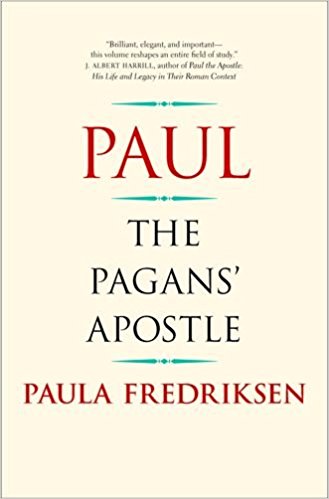Yes, it is true that Paul’s polemic in Galatians is aimed at the Judaizers, but he is also very critical of Peter and even Barnabas, two fellow Jewish Christ followers, for hypocrisy, for ‘living like a Gentile’ which can only mean not living fully in accord with Jewish law, and yielding under pressure to do so. The Pauline Gospel involved an inherent critique of early Judaism for the majority of Jews not recognizing their own Messiah, and for failing to realize that the eschatological time had come for one and all to embrace a new covenant inaugurated by Christ’s death and resurrection. Paul was not simply critiquing Judaizing of Gentiles by the circumcision party, though he critiqued that as well (see pp. 99-100).
Paul also believed that his Gospel was thoroughly Jewish, he was no anti-Semite, but as such he believed that the Jewish messiah who was also the savior of Gentiles had to be embraced by one and all, as did the new covenant spoken of by Jeremiah. Further, he even believed that one day ‘all Israel’ would also be saved by Jesus at his return after the full number of Gentiles had come in.
The later anti-Semitic readings of Paul by various of the patristic fathers, and later by F.C. Baur and his disciples should not be laid at the doorstep of Paul, nor should James, Peter, and John be lumped together with the circumcision party as both Gal. 1-2 and Acts 15 make clear. But that doesn’t mean that Paul did not take a radical view of the Mosaic covenant— he did. Thus while I agree with Paula that Paul did rejecting Judaizing of Gentiles and did not reject all forms of early Judaism (see p. 130), the only form he affirms is eschatological Christ-following Jewishness that recognizes the new covenant of Jeremiah has been inaugurated by Christ, which in turn means that the time for observance of the Mosaic covenant has come and gone for one and all.
Fredricksen speculates as to why the Judaizers were insisting on the circumcision of Gentile converts to Christ, suggesting perhaps they had become alarmed with the large numbers of Gentiles joining the Jesus movement, and saw that as impeding the Gospel being received by Jews in Judaea and presumably also the Diaspora (p. 103). On the surface this seems possible or even plausible but it ignores several facts: 1) Galatians is describing Paul’s first missionary efforts which he then went to Jerusalem to discuss with the pillar apostles. Gentiles were not yet flooding into the new community, and certainly were not doing so in Jerusalem; 2) Fredricksen continues to suggest (pp. 101-02) that everyone thought the end of all things was just around the corner, and when the Parousia kept being ‘delayed’ this created certain kinds of questioning as to why it was delayed— could it be that the new movement was not doing a good enough job of bringing in Diaspora Jews along with the Gentiles? Could that have caused the delay.
The problem with this whole approach is a misreading of the eschatology of the earliest Christians. They were not standing around singing ‘he’s late, he’s late, for a very important date’. It is not the delay of the parousia that shapes Paul’s thoughts, or that of James and others. It is the fact that the eschaton has already been inaugurated by the death and resurrection of Jesus. Jesus himself had repudiated all such date setting anyway saying he simply didn’t know the time of the return of the Son of Man (Mk. 13.32). This is hardly a logion Mark or other early Christians who saw Jesus as part of the divine identity, and worshipped him, would have made up ex post facto. Could we please now let the ghost of Albert Schweitzer rest in peace, and stop allowing his misreading of Paul to continue to haunt the way we evaluate Paul?












